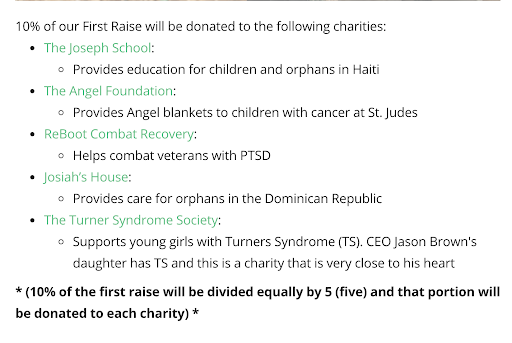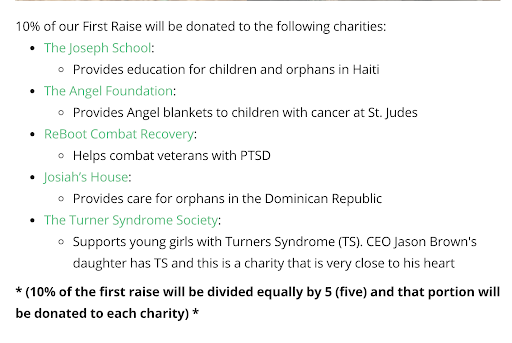Called Higher Studios
Making Movies That Matter
Overview
Raised: $1,069,991
Rolling Commitments ($USD)
03/30/2020
$6,993
3,769
2019
Media, Entertainment & Publishing
Non-Tech
B2C
Low
High
Summary Profit and Loss Statement
| Most Recent Year | Prior Year | |
|---|---|---|
|
Revenue |
$0 |
$0 |
|
COGS |
$0 |
$0 |
|
Tax |
$0 |
$0 |
| ||
| ||
|
Net Income |
$0 |
$0 |
Summary Balance Sheet
| Most Recent Year | Prior Year | |
|---|---|---|
|
Cash |
$0 |
$0 |
|
Accounts Receivable |
$0 |
$0 |
|
Total Assets |
$0 |
$0 |
|
Short-Term Debt |
$0 |
$0 |
|
Long-Term Debt |
$0 |
$0 |
|
Total Liabilities |
$0 |
$0 |
Raise History
| Offering Name | Close Date | Platform | Valuation/Cap | Total Raised | Security Type | Status | Reg Type |
|---|---|---|---|---|---|---|---|
| Called Higher Studios | 04/06/2024 | Wefunder | - | $34,970 | Revenue Share | Funded | RegCF |
| Called Higher Studios | 09/14/2023 | StartEngine | $9,025,659 | $625,826 | Equity - Common | Funded | RegCF |
| Called Higher Studios | 04/15/2023 | Wefunder | $18,014,776 | $599,610 | Equity - Common | Funded | RegCF |
| Called Higher Studios | 06/30/2021 | StartEngine | $10,300,000 | $869,263 | Equity - Common | Funded | RegA+ |
| Called Higher Studios | 03/30/2020 | StartEngine | $1,730,000 | $1,069,991 | Equity - Common | Funded | RegCF |
Price per Share History
Note: Share prices shown in earlier rounds may not be indicative of any stock splits.
Valuation History
Revenue History
Note: Revenue data points reflect the latest of either the most recent fiscal year's financials, or updated revenues directly from the founder, at each raise's close date.
Employee History
Upgrade to gain access
-
$25 /month
billed annually - Free portfolio tracking, data-driven ratings, AI analysis and reports
- Plan Includes:
- Everything in Free, plus
- Company specific
KingsCrowd ratings and analyst reports
- Deal explorer and side-by-side comparison
- Startup exit and failure tracking
- Startup market filters and historical industry data
- Advanced company search ( with ratings)
- Get Edge Annual
Edge
Summary
Called Higher Studios has been designated as an “Underweighted Deal” by KingsCrowd. This distinction is reserved for deals not selected into the top 10%-20% of our due diligence funnel. If you have questions regarding our deal diligence and selection methodology, please reach out to hello@kingscrowd.com.
The movie space is large, often profitable (for the right parties), and glamourous. For all of this, and despite the fact that a majority of American adults describe themselves as Christians, very few Christian films are made in any given year. Granted, there are a number of faith-based films that have been released over the years. Some have been flops. Others tremendous successes (Think ‘Passion of the Christ’). Compared to the broader film industry, though, these types of productions are a small fragment of the market. It is here, though, that the founders of Called Higher Studios see an opportunity. By diving in and creating quality content, the studio hopes to capture a piece of this mark. In the process, their social mission will be to spread God’s word and love to those who will watch and listen.
Problem
There is a crisis of faith in the US today. Back in 2009, 77% of American adults described themselves as Christians. By 2019, this figure had dropped to 65%. Over this timeframe, the US population rose by 23 million. Despite this, though, the number of American adults who identified as Christians dropped from 178 million to 167 million. This is still, by far, the largest religious group, with the largest sub-group (at 43% of the population) being protestants. A significant part of the decline comes from America’s youngest adults, with only 49% of Millennials claiming to be Christian.

*Taken from Pew Research Center
Solution

*Taken from Called Higher Studios
Called Higher Studios has been set up to combat this issue. Management believes it and its shareholders can benefit from the disconnect between the large number of citizens who identify as Christians and the small number of faith-based films that have been shot. The company aims to create Christian-based content, primarily movies, that spread the word of God to the masses. In particular, the company appears interested in small-budget films. In discussing the opportunity in its advertising documents, management uses the film God’s Not Dead as an example. According to management, the film cost only $2 million to produce and went on to generate $60.76 million in the domestic box office. This translates to a more than 30 times return. Though their numbers are almost accurate (the production cost was only $1.15 million), there are some caveats to their thinking we’ll discuss later.
The management team at Called Higher Studios has worked on several films. Collectively, these titles went on to generate more than $1 billion in global box office receipts. Management’s goal now is to take their talents and aim them at small-budget, Christian-based films in the hopes of realizing value there. Revenue can be generated through the box office, but that’s only the start. Management intends to use their business to help market for other Christian studios and content creators. It also wants to work with influencers and brands, including its own. Its goal is to create and sell company-branded merchandise (as well as the merchandise of other faith-based companies) and to create shows for major social media platforms.

*Taken from Called Higher Studios
This is an excellent set of goals for management, but their first big hurdle will be to come out with a successful movie first. At this time, the company has not disclosed a particular movie it intends to work on. In fact, this brings us to some major issues for the business. As of June of this year, the company had precisely nothing in terms of financials. It had no assets, no liabilities, and no revenue or expenses. Upon raising the capital it is seeking, it intends to allocate 10% immediately toward a mix of five non-profit initiatives (shown below). Another 25% to 30% of capital will go toward marketing. This includes promoting the company for future raises. A further 40% will be classified as working capital. This chunk is basically a blank check for management to use the funds however they want.

*Taken from Called Higher Studios
In short, they have not identified a particular project they want to push. In addition to this, what money they hope to raise will be spent, likely, on maintaining the business and searching for more funding. Even a small-budget film can cost millions of dollars to produce and warrant many millions of dollars more in order to promote. To ask investors for money that likely won’t even go toward a specified project at a time when the company has no assets of its own to use toward production is opening the door to future dilution. Without extra cash, on hand, the company must eventually go out and raise more money. That or it will need to find an investor who will come in on a revenue-sharing basis for their films. Likely, this will be in the low millions, if not more, to get a film produced, so the latter is a tough sell.
The Market
At this time, Christians comprise the largest religious group in the United States. This implies some opportunity in the movie space, but it’s not as large as you might expect. In its promotional documents, Called Higher Studios lists six Christian films that they see as quality examples of what kind of content they wish to produce. The list can be seen in the table below. It contains the title, domestic box office, foreign box office, global box office, and budget of each film management pointed to.

*Created by Author
**$ in Millions
*** All Figures Taken From https://www.the-numbers.com/
Of the six films used, only two saw global box office receipts exceed $100 million, and only one saw them pass the $500 million mark (The Passion of the Christ). The timing of release for these films has ranged from 2004 through 2018. The average global box office receipts of these six films were $170.08 million. Excluding the $622.34 million powerhouse that was The Passion of the Christ, this average drops to $79.63 million. To put this in perspective, entertainment giant The Walt Disney Company saw, in the 44 films under its name since 2006, an average box office of $850 million.
If presented with these numbers, management would argue that their goal is to focus on small-budget films. These have small upfront costs and even a modest amount of success at the box office can be wildly profitable. This is a fair point. However, the definition of ‘small-budget’ is subjective. The Passion of the Christ had a production budget of $25 million. Heaven is for Real cost $12 million. Perhaps the only movie they could emulate would be God’s Not Dead, which cost $1.15 million, but even that is likely to require another big raise. The next closest would be War Room, which cost $3 million.
It’s also important to keep in mind that production cost isn’t everything. The company will also have distribution and marketing expenses. These are more commonly known in the industry as printing and advertising costs. According to one source, a small-budget film might need to spend even more on printing and advertising costs than it does on production. One exception to this is if the film in question has extremely popular source material that can act as a sort of self-advertisement.
Another issue is that the movie industry is a tough space to occupy, and Christian audiences can be incredibly fickle. While the first installment of God’s Not Dead performed well, its sequel, God’s Not Dead 2, cost $5 million to make. Yet its global box office was only $23.55 million. The third installment in the series cost $5.73 million but was a flop with a box office release of only $7.36 million. Even movies in this space that should have impressive built-in audiences can easily miss the mark… multiple times. The Left Behind series, a work of 16 novels published by Tim LaHaye and Jerry B. Jenkins, have gone on to sell more than 80 million copies worldwide. Yet the movie based on the first book generated only $4.2 million in the box office against a production budget of $4 million. The 2014 remake of the series, starring Nicolas Cage, didn’t do much better. Its budget was $16 million, but its global box office receipts totaled only $20.77 million.
There’s also the problem of compensation and how it works in the movie theater industry. Generally speaking, a sizable portion of a film’s box office receipts go to the theater. A typical movie might see 60% of the ticket revenue generated go to the studio in the first week or two of release. As time goes on, though, the share of revenue retained by the theater grows. In 2017, Regal Entertainment Group generated admissions revenue of $2.008 billion. For this, it had to allocate $1.068 billion (or 53.2% of its take) toward film rental and advertisement costs. In its latest fiscal year, rival AMC Entertainment Holdings generated $2.44 billion from admissions. To cover this, though, it has to pay $1.32 billion (or 54.2%) of its revenue toward film exhibition costs.
This suggests that Called Higher Studios might retain between 50% and 60% of its box office receipts. Let’s say the company is fortunate enough to see a $2 million film generate a box office return worth $60 million. Take away 40% of that for the theaters and this suddenly drops to $36 million. Then take away whatever printing and advertising costs, which can easily hit millions of dollars more, and that’s a more accurate take. If Called Higher Studios scores a win from its first film, this is still a significant amount of upside, but the costs to get there cannot be understated.
Terms of the Deal
The overall structure of the proposed transaction is about as simple as they get in capital raising. Management is seeking to sell to investors its Class A Voting Common Stock. The minimum investment per person is $100, with shares going for $1 a piece. In all, management is seeking a raise of up to $1.07 million, but it has set a low minimum of $10,000 that it can close the transaction if need be. The firm has assigned itself a pre-money valuation of $1.73 million. This means that incoming investors will receive equity in the company of between 0.6% (if $10,000 is raised) and 38.2%.
Management
At this time, there are three main individuals working to build Called Higher Studios: Jason Brown, Ash Greyson, and C. Neil Davenport. Brown and Greyson are both the company’s co-founders, with Brown serving as its CEO and Greyson as the Head of its Advisory Board. Davenport’s role at the company is listed as Writer. Brown has produced feature films that have been distributed by Netflix & Walmart. He has started multiple companies, including Aroluxe, LLC, a marketing agency which he sold in 2017. Additionally, he founded a production company that helped to create over 300 hours of network television. This content aired on POPtv, a channel owned by CBS & Lionsgate. Greyson, meanwhile, has more than 20 years of media experience. His roles have ranged from producing, to marketing, and to digital and social strategies. All of his projects involved faith-based films. He has performed work for companies including Lionsgate, Sony Pictures, Focus Features, Paramount, Roadside Attractions, Syfy Channel, Nat Geo Network, TBN, Walden Media, and PureFlix. Ash’s marketing campaigns were significant in promoting both God’s Not Dead and 2016: Obama’s America. Davenport earned a B.A. from Augusta University. His work experience includes projects for commercials, film, and television episodes (all unnamed).
Rating
The movie business is fun, exciting, and offers a lot of upside. For small upstarts like Called Higher Studios, the only path is to focus on the high-stakes small-budget space. This can be incredibly rewarding, even if the films are not faith-based. They are also high stakes. A small production budget also comes with small printing and advertising budgets. This limits reach and distribution. If Called Higher Studios had something other than a completely blank balance sheet, and/or some other record (like another film or a film-in-the making) to its name, it could be an appealing prospect. Without these, there are too many issues here to ignore.
Investors are essentially giving money to a business that currently has no fundamental value. They are investing in management to go out, raise the capital needed to produce a small-budget film, and are left hoping that whatever is produced generates a return high enough to offset the million-dollar-plus budget of the film and the printing and advertising costs. None of this includes the box office’s take. The project must also create enough capital for the company to proceed with a second film, or else it’s back to square one. Though the company might go on to become a tremendous success, this opportunity is risky. It seems more akin to betting it all on red in a Las Vegas casino than it does making a wise investment.
